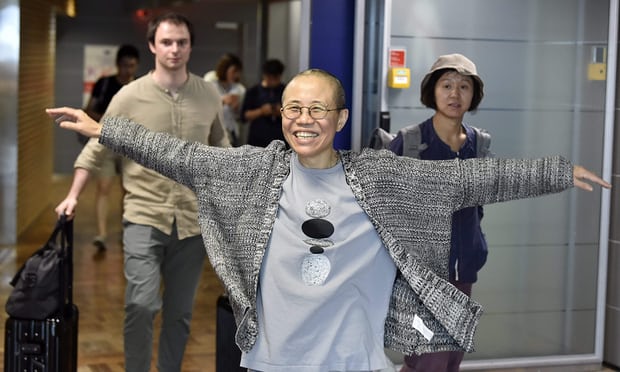Liu Xia
Liu Xia, widow of Nobel laureate Liu Xiaobo, arrived in Germany on Tuesday after more than eight years of house arrest. At 4.49pm, the poet and dissident activist touched down in Berlin, where she is now reportedly seeking medical attention.
Her release — the result of a sustained campaign by the German government — was confirmed by friends and supporters on social media. Liu Xia has flown to Europe to “start a new life”, her brother Liu Wu confirmed in a WeChat post.
“Ever since her late husband received the Nobel peace prize while in a Chinese prison, Liu Xia was also unjustly detained. The German government deserves credit for its sustained pressure and hard work to gain Liu Xia’s release,” said Sophie Richardson, the China director at Human Rights Watch.
Chinese authorities have repeatedly insisted that she was free to move as she wished, despite reports to the contrary. An audio clip in which Liu articulated her anguish to friend and exiled writer Liao Yiwu was published by Liao in May 2018.
“Now, I’ve got nothing to be afraid of,” she says to Liao. “If I can’t leave, I’ll die in my home. Xiaobo is gone, and there’s nothing in the world for me now. It’s easier to die than live. Using death to defy could not be any simpler for me.”
A photo of Liu Xia that was taken as she entered Helsinki airport on the way to Berlin, with arms outstretched and a look of elation on her face, stands in stark contrast to the despair of just a few months ago.

Liu Xia smiles as she arrives at Helsinki airport on her way to Berlin. (Jussi Nukari/AFP/Getty Images)
The Chinese government’s surveillance and unofficial imprisonment of Liu came after her husband Liu Xiaobo was awarded the Nobel Peace Prize in 2010. At the time, he was serving one year of an 11-year sentence for “subversion of state power” for his involvement in Charter 08, a manifesto calling for reforms in Chinese governance. For the next eight years, Liu Xia battled heart ailments and depression while police kept watch outside her home.
News of Liu Xia’s release comes on the heels of German chancellor Angela Merkel’s visit with Chinese premier Li Keqiang, raising speculation over whether the release is part of a larger deal between Germany and China. The two countries have borne the brunt of US president Donald Trump’s ongoing tariff war.
“Is Liu Xia’s release all about softening up the German chancellor, as one of the most important representatives of the liberal industrial nations, in order to form a joint front against Trump?”, wrote the German weekly newspaper Die Zeit. “It’s an ugly suspicion, but one that can’t be dismissed out of hand.”
Those allegations were denied by Hua Chunying, a spokeswoman for China’s foreign ministry, who said that Liu Xia’s flight to Germany was “in accordance with her own will.”
True or not, Liu Xia’s release comes at a time waning of support for civil liberties among other developed countries.
“Liu Xia can finally leave China — not because Xi Jinping had a change of heart, but because of the unity displayed by the global civil society. Her freedom has been fought for by freedom fighters around the world who pressured Beijing on the matter,” tweeted activist Joshua Wong. Wong, himself came to prominence for his role in the Umbrella Movement, which emerged during the Hong Kong democracy protests of 2014.
Herself an artist, Liu used poetry, painting, and photography to sound the complexities of life as a dissident. Symbols of her and her husband Liu Xiaobo’s struggles infuse her work, wrote critic and author Ian Johnson in a New York Review of Books article: a bird for freedom, an empty chair for Xiaobo, who never made it to the Nobel peace prize ceremony.
A chair and a pipe
wait for you in vain.
No one sees you walking down the street.
In your eyes, a bird is flying,
green fruit hangs from a tree without leaves —
since that morning, the fruit refuses
to ripen in the fall. — Liu Xia (Empty Chairs — Selected Poems)